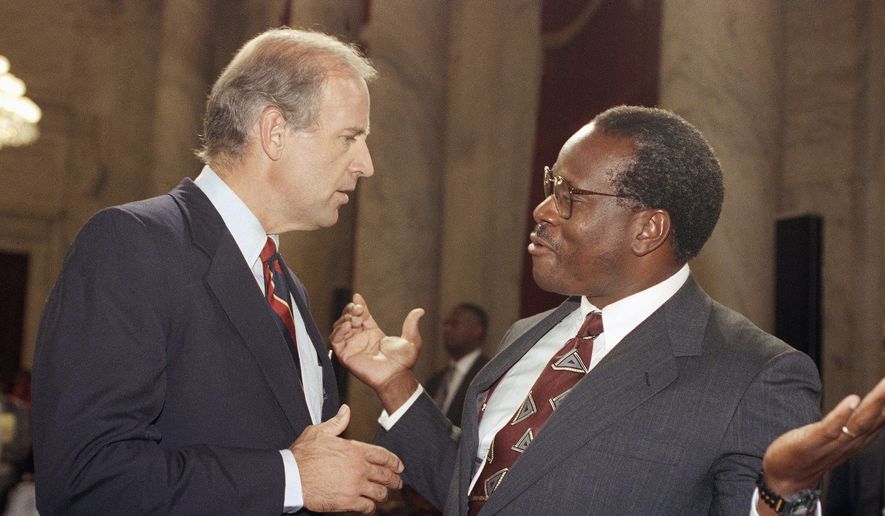Justice Clarence Thomas scoffed at 2020 Democratic front-runner former Vice President Joseph R. Biden recalling his confirmation hearing nearly three decades ago, suggesting Mr. Biden didn’t have a grasp of the law and was just playing politics.
“I have no idea what he was talking about,” Justice Thomas said in a new documentary about his life, detailing his childhood and rise to the Supreme Court.
The legal questioning from Mr. Biden, who at the time was chairman of the Senate Judiciary Committee and running the confirmation hearings, was aimed at Justice Thomas’ views on Roe v. Wade, the ruling which legalized abortion in 1973.
“One of the things you do in hearings is you have to sit there and look attentively at people you know have no idea what they’re talking about. And it was fine. I understood what he was trying to do. I didn’t really appreciate it,” Justice Thomas added.
But that, of course, was not the memory of his confirmation hearing that most consumes him. He is still haunted by Anita Hill, who came forward to say the judge sexually harassed her — a claim he vehemently denied.
The allegation had been investigated by the FBI, which said it was unfounded, but somehow, as things do in Washington, it leaked to the press.
“This was a crime,” Justice Thomas said in the two-hour documentary.
The film, “Created Equal: Clarence Thomas In His Own Words,” was exclusively revealed to a crowd last week in the basement of the National Archives.
Many of Justice Thomas’ close friends and allies were on hand Tuesday night for heavy hors d’oeuvres and refreshments steps from the eternal home of the Declaration of Independence and Constitution before heading to a theater located a few flights below the nation’s foundational documents.
The audience was littered with Trump administration officials, federal judges, Supreme Court employees, Justice Clarence Thomas’ law clerks, as well as key judicial advisers to President Trump, such as Federalist Society Executive Vice President Leonard Leo.
The film depicts Justice Thomas sharing his personal and professional maturation with never-before aired details and insights unfiltered through the lens of the press.
Justice Thomas walks viewers through his upbringing in Savannah, Georgia, with the influence of his grandfather, his Catholic education, and eventually his rise to the Supreme Court. He surprises viewers with an account of his youth as a far-left advocate who transformed over the years to what some court watchers would describe as the most conservative justice on the high court.
Justice Thomas said he worked hard to get perfect test scores in school, making sure he could avoid criticism as he rose in his career.
“Leave them nothing but race,” Mr. Thomas said of his critics.
The only black justice currently on the high court replaced the late Justice Thurgood Marshall, the court’s first black member, in 1991.
He’s been known for his “bloodthirsty” originalism as well as his silence.
While many of his colleagues like to pepper attorneys with questions during oral arguments, Justice Thomas goes years — at one time more than a decade — without asking a single question. Instead, he relies heavily on the parties’ briefs.
“We are judges, not advocates,” Justice Thomas said, explaining his reason for staying mum.
Michael Pack, the documentary’s filmmaker, said in an audience question-and-answer session after the screening that Justice Thomas has not yet seen the film, but his wife, Ginni Thomas, has.
“Ginni [Thomas] said she cried when she saw it,” Mr. Pack said. “Justice Thomas may not look forward to seeing it, but I hope he does.”
Mr. Pack said he intends for the movie to debut Jan. 31, 2020, and wants it to hit movie theaters in 20 cities as well as its planned airing on PBS.
Mr. Pack said while getting the documentary shown on PBS was always his goal — to reach audiences skeptical of Justice Thomas — he is on a mission of getting it in front of high school students.
Mr. Pack said Justice Thomas’ story and that of his family is not well known, but Mr. Pack thought the story should be a regular fixture of secondary school education, particularly surrounding Black History Month.
• Ryan Lovelace can be reached at rlovelace@washingtontimes.com.
• Alex Swoyer can be reached at aswoyer@washingtontimes.com.




Please read our comment policy before commenting.